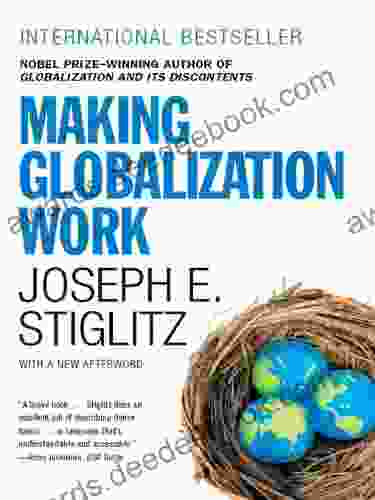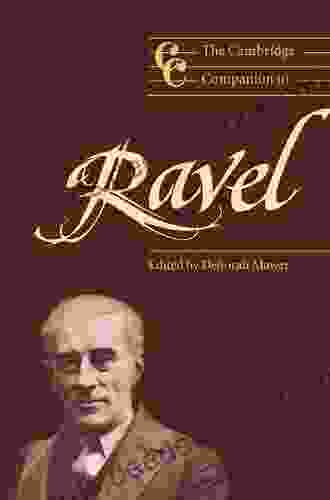State, Trust, and Corporation: Cambridge Texts in the History of Political Thought

<meta name="viewport" content="width=device-width, initial-scale=1.0"> <meta name="keywords" content="State, trust, corporation, political thought, Cambridge Texts in the History of Political Thought, social order, state authority, individual autonomy, corporations, modern world"> The concepts of state, trust, and corporation have played a central role in shaping political thought and the development of political systems throughout history. These concepts have been explored and debated by philosophers, political scientists, and historians for centuries, and they continue to be relevant and contested in contemporary political discourse. This article aims to provide a comprehensive overview of these concepts, drawing upon historical and contemporary perspectives. It will also discuss the significance of these concepts in shaping political systems and institutions, and the challenges posed by their evolution in the modern world. <h2>The State</h2> The state is a complex and multifaceted concept that has been defined in many different ways. In general, the state can be understood as a political entity that has sovereignty over a territory and its people. The state has the power to make and enforce laws, collect taxes, and provide public services. It also has the power to use force to maintain order and protect its citizens from external threats. The state is a relatively recent development in human history. The first states emerged in Mesopotamia and Egypt around 3500 BCE. These early states were small and relatively weak, but over time they grew in size and power. The rise of the state was accompanied by the development of new forms of social organization and control. There are many different theories about the origins of the state. Some scholars argue that the state emerged as a way to regulate conflict and provide security. Others argue that the state emerged as a way to exploit the labor of the masses. Still others argue that the state emerged as a way to protect the interests of the ruling class. Whatever its origins, the state has become a central feature of human society. The state provides essential services, such as law enforcement, education, and healthcare. It also plays a role in regulating the economy and protecting the environment. <h2>Trust</h2> Trust is a fundamental concept in human society. Trust is the belief that someone or something is reliable, honest, and competent. Trust is essential for cooperation and social order. Without trust, it would be impossible to build relationships, conduct business, or engage in any kind of meaningful social interaction. There are many different types of trust. We can trust our friends, family members, colleagues, and even strangers. We can trust institutions, such as governments, businesses, and schools. We can trust that the food we eat is safe, that the water we drink is clean, and that the roads we drive on are well-maintained. Trust is not something that is given freely. It must be earned over time. Trust is built through repeated interactions and positive experiences. When someone breaks our trust, it can be difficult to rebuild. Trust is essential for the functioning of a healthy society. Trust allows us to cooperate with each other, to share resources, and to build strong communities. Trust is also essential for the legitimacy of political systems. When citizens trust their government, they are more likely to obey the law and participate in the political process. <h2>Corporations</h2> Corporations are legal entities that are separate from their owners. Corporations can own property, enter into contracts, and sue and be sued. Corporations are created by law and are governed by a board of directors. Corporations first emerged in the late Middle Ages as a way to organize and finance large-scale economic ventures. The first corporations were chartered by kings and queens to finance expeditions to the New World and to establish colonies. Over time, corporations became increasingly powerful. By the 19th century, corporations had become the dominant form of business organization in the United States and Europe. Corporations played a major role in the Industrial Revolution and the rise of capitalism. Corporations have a number of advantages over other forms of business organization. Corporations can raise large amounts of capital, they can limit the liability of their owners, and they can operate indefinitely. These advantages have allowed corporations to become the dominant form of business organization in the modern world. However, corporations have also been criticized for their power and their lack of accountability. Critics argue that corporations are too powerful and that they are not accountable to the public. They argue that corporations have too much influence over government and that they are responsible for many of the social and environmental problems facing the world today. <h2>The Relationship Between State, Trust, and Corporation</h2> The relationship between state, trust, and corporation is complex and dynamic. The state, trust, and corporation are all essential components of modern society. However, there is also a tension between these three entities. The state has a responsibility to protect its citizens from the harms that can be caused by corporations. For example, the state can regulate corporations to prevent them from polluting the environment, exploiting their workers, or defrauding consumers. However, the state must also be careful not to stifle economic growth and innovation. The state needs to create a legal and regulatory environment that encourages corporations to invest and create jobs. Trust is essential for the functioning of both the state and corporations. Citizens must trust the state to protect their interests and to act in a fair and impartial manner. Investors must trust corporations to be honest and transparent in their dealings with them. However, trust can be difficult to maintain in a world where there are many competing interests. The state can be tempted to use its power to benefit itself or its supporters. Corporations can be tempted to put their profits ahead of the interests of their customers, employees, and the environment. It is important to strike a balance between the need for state regulation and the need for economic growth. It is also important to promote trust between the state, corporations, and citizens. By ng so, we can create a more just and prosperous society for all. The concepts of state, trust, and corporation are essential for understanding political thought and the development of political systems. These concepts have been explored and debated by philosophers, political scientists, and historians for centuries, and they continue to be relevant and contested in contemporary political discourse. This article has provided a comprehensive overview of these concepts, drawing upon historical and contemporary perspectives. It has also discussed the significance of these concepts in shaping political systems and institutions, and the challenges posed by their evolution in the modern world. <h2>Further Reading</h2> * **Cambridge Texts in the History of Political Thought** (https://www.cambridge.org/core/series/cambridge-texts-in-the-history-of-political-thought) * **The State, Trust, and Corporation** by David Held (https://www.polity.co.uk/bookDetail?bookCode=9780745615032) * **Trust and Democracy** by Francis Fukuyama (https://www.fukuyama.com/books/trust-and-democracy) * **The Corporation** by Joel Bakan (https://www.amazon.com/Corporation-Pathology-Power-Profits-Solution/dp/0743260484)5 out of 5
| Language | : | English |
| File size | : | 744 KB |
| Text-to-Speech | : | Enabled |
| Screen Reader | : | Supported |
| Enhanced typesetting | : | Enabled |
| Word Wise | : | Enabled |
| Print length | : | 204 pages |
| Lending | : | Enabled |
Do you want to contribute by writing guest posts on this blog?
Please contact us and send us a resume of previous articles that you have written.
 Book
Book Chapter
Chapter Genre
Genre Reader
Reader E-book
E-book Magazine
Magazine Newspaper
Newspaper Paragraph
Paragraph Sentence
Sentence Bookmark
Bookmark Shelf
Shelf Bibliography
Bibliography Foreword
Foreword Annotation
Annotation Scroll
Scroll Codex
Codex Bestseller
Bestseller Classics
Classics Narrative
Narrative Biography
Biography Memoir
Memoir Reference
Reference Encyclopedia
Encyclopedia Dictionary
Dictionary Thesaurus
Thesaurus Resolution
Resolution Librarian
Librarian Catalog
Catalog Card Catalog
Card Catalog Archives
Archives Periodicals
Periodicals Research
Research Scholarly
Scholarly Academic
Academic Journals
Journals Reading Room
Reading Room Thesis
Thesis Dissertation
Dissertation Storytelling
Storytelling Awards
Awards Shawn James
Shawn James Robert Johnson
Robert Johnson Frank Cicero Jr
Frank Cicero Jr Martin King
Martin King Victoria Holt
Victoria Holt James Mcdonald
James Mcdonald Leslie Wolfe
Leslie Wolfe T M Mcgee
T M Mcgee Helen J Knowles
Helen J Knowles Martha Minow
Martha Minow Neil Harrison
Neil Harrison Laurie Carlson
Laurie Carlson Arx Reads
Arx Reads Linda Francis Lee
Linda Francis Lee Frank Visser
Frank Visser E J Braswell
E J Braswell Print Replica Kindle Edition
Print Replica Kindle Edition Ran Spiegler
Ran Spiegler Sontje Beermann
Sontje Beermann Eve Megan Ringsmuth
Eve Megan Ringsmuth
Light bulbAdvertise smarter! Our strategic ad space ensures maximum exposure. Reserve your spot today!
 Joseph FosterFollow ·12.8k
Joseph FosterFollow ·12.8k Fletcher MitchellFollow ·4.9k
Fletcher MitchellFollow ·4.9k Bradley DixonFollow ·9.6k
Bradley DixonFollow ·9.6k Ross NelsonFollow ·14.8k
Ross NelsonFollow ·14.8k Edgar Allan PoeFollow ·11.3k
Edgar Allan PoeFollow ·11.3k William PowellFollow ·15.7k
William PowellFollow ·15.7k Theodore MitchellFollow ·5.5k
Theodore MitchellFollow ·5.5k Elton HayesFollow ·14.9k
Elton HayesFollow ·14.9k
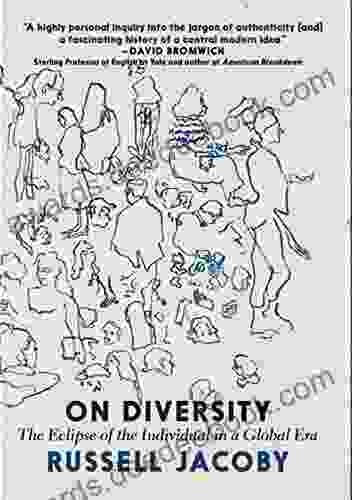
 Roger Turner
Roger TurnerThe Waning of the Individual in the Global Era: A...
In the rapidly globalizing world of today,...

 Reginald Cox
Reginald CoxFirst of Verbs: An Early Language
The First of Verbs (FOV) is an early...

 Cody Blair
Cody BlairThe Biography Of The Myth: Routledge Historical...
Who is the Myth?...
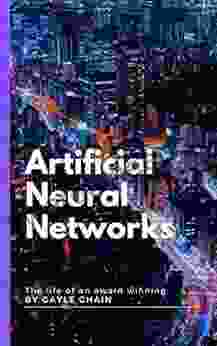
 Dean Cox
Dean CoxArtificial Neural Networks: Unraveling the Amazing...
Artificial Neural Networks (ANNs),...
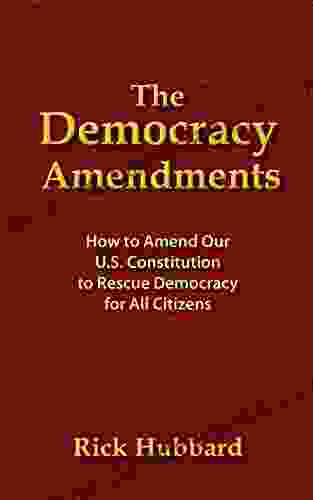
 Kyle Powell
Kyle PowellHow To Amend Our Constitution To Rescue Democracy For All...
Our democracy is in...
5 out of 5
| Language | : | English |
| File size | : | 744 KB |
| Text-to-Speech | : | Enabled |
| Screen Reader | : | Supported |
| Enhanced typesetting | : | Enabled |
| Word Wise | : | Enabled |
| Print length | : | 204 pages |
| Lending | : | Enabled |







